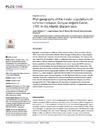Please use this identifier to cite or link to this item:
https://accedacris.ulpgc.es/jspui/handle/10553/72727
| DC Field | Value | Language |
|---|---|---|
| dc.contributor.author | Quinteiro, Javier | en_US |
| dc.contributor.author | Rodríguez-Castro, Jorge | en_US |
| dc.contributor.author | Rey-Méndez, Manuel | en_US |
| dc.contributor.author | González Henríquez, María Nieves | en_US |
| dc.contributor.editor | Ruggeri, Paolo | - |
| dc.date.accessioned | 2020-05-22T07:41:01Z | - |
| dc.date.available | 2020-05-22T07:41:01Z | - |
| dc.date.issued | 2020 | en_US |
| dc.identifier.issn | 1932-6203 | en_US |
| dc.identifier.uri | https://accedacris.ulpgc.es/handle/10553/72727 | - |
| dc.description.abstract | This is an open access article distributed under the terms of the Creative Commons Attribution License, which permits unrestricted use, distribution, and reproduction in any medium, provided the original author and source are credited. Exploited, understudied populations of the common octopus, Octopus vulgaris Cuvier, 1797, occur in the northeastern Atlantic (NEA) throughout Macaronesia, comprising the Azores, Madeira and Canaries, and also the Cabo Verde archipelago. This octopus species, found from the intertidal to shallow continental-shelf waters, is largely sedentary, and the subject of intense, frequently unregulated fishing effort. We infer connectivity among insular populations of this octopus. Mitochondrial control region and COX1 sequence datasets reveal two highly divergent haplogroups (α and β) at similar frequencies, with opposing clinal distributions along the sampled latitudinal range. Haplogroups have different demographic and phylogeographic patterns, with origins related to the two last glacial maxima. FST values suggest a significant differentiation for most pairwise comparisons, including insular and continental samples, from the Galicia and Morocco coasts, with the exception of pairwise comparisons for samples from Madeira and the Canaries populations. Results indicate the existence of genetically differentiated octopus populations throughout the NEA. This emphasizes the importance of regulations by autonomous regional governments of the Azores, Madeira and the Canaries, for appropriate management of insular octopus stocks. | en_US |
| dc.language | eng | en_US |
| dc.relation.ispartof | PLoS ONE | en_US |
| dc.source | PLOS ONE [ISSN 1932-6203], vol. 15(3), p. e0230294 | en_US |
| dc.subject | 240119 Zoología marina | en_US |
| dc.subject | 250501 Biogeografía | en_US |
| dc.title | Phylogeography of the insular populations of common octopus, octopus vulgaris cuvier, 1797, in the atlantic macaronesia | en_US |
| dc.type | info:eu-repo/semantics/article | en_US |
| dc.type | Article | en_US |
| dc.identifier.doi | 10.1371/journal.pone.0230294 | en_US |
| dc.identifier.pmid | 15 | - |
| dc.identifier.scopus | 2-s2.0-85082086904 | - |
| dc.contributor.orcid | #NODATA# | - |
| dc.contributor.orcid | #NODATA# | - |
| dc.contributor.orcid | #NODATA# | - |
| dc.contributor.orcid | #NODATA# | - |
| dc.identifier.issue | 3 | - |
| dc.relation.volume | 15 | en_US |
| dc.investigacion | Ciencias | en_US |
| dc.type2 | Artículo | en_US |
| dc.utils.revision | Sí | en_US |
| dc.contributor.wosstandard | Ruggeri, Paolo | - |
| dc.contributor.wosstandard | Ruggeri, Paolo | - |
| dc.contributor.wosstandard | Ruggeri, Paolo | - |
| dc.contributor.wosstandard | Ruggeri, Paolo | - |
| dc.contributor.wosstandard | Ruggeri, Paolo | - |
| dc.identifier.ulpgc | Sí | en_US |
| dc.description.sjr | 1,1 | |
| dc.description.jcr | 2,776 | |
| dc.description.sjrq | Q1 | |
| dc.description.jcrq | Q2 | |
| dc.description.scie | SCIE | |
| dc.description.erihplus | ERIH PLUS | |
| item.fulltext | Con texto completo | - |
| item.grantfulltext | open | - |
| crisitem.author.dept | GIR IUNAT: Biología Integrativa y Recursos Biológicos | - |
| crisitem.author.dept | IU de Estudios Ambientales y Recursos Naturales | - |
| crisitem.author.orcid | 0000-0003-1110-0448 | - |
| crisitem.author.parentorg | IU de Estudios Ambientales y Recursos Naturales | - |
| crisitem.author.fullName | González Henríquez, Maria Nieves Elvira | - |
| Appears in Collections: | Artículos | |
SCOPUSTM
Citations
10
checked on Jun 8, 2025
WEB OF SCIENCETM
Citations
10
checked on Feb 1, 2026
Page view(s)
328
checked on Jan 16, 2026
Download(s)
118
checked on Jan 16, 2026
Google ScholarTM
Check
Altmetric
Share
Export metadata
Items in accedaCRIS are protected by copyright, with all rights reserved, unless otherwise indicated.
